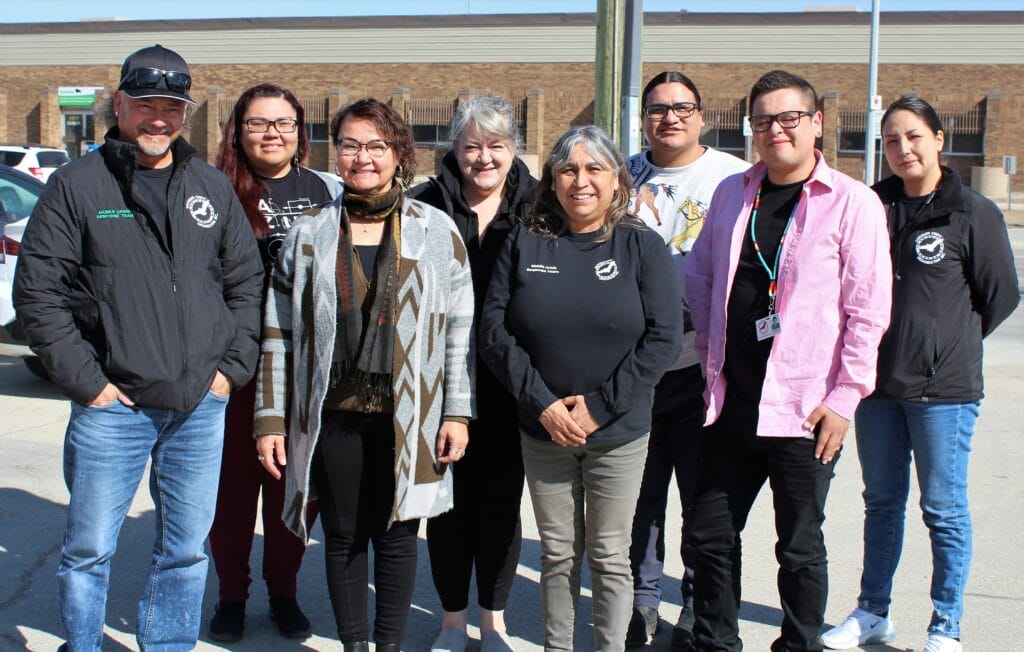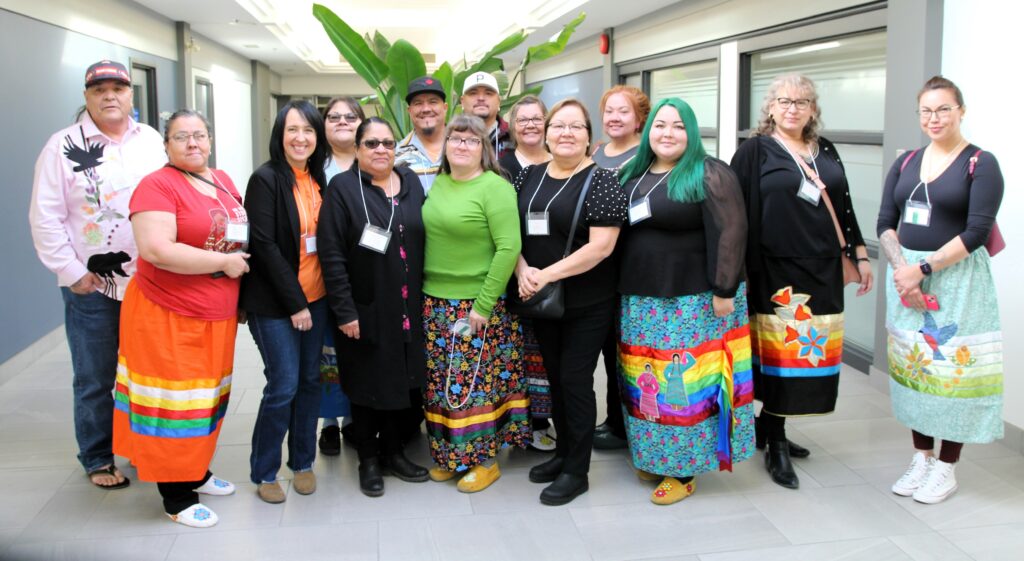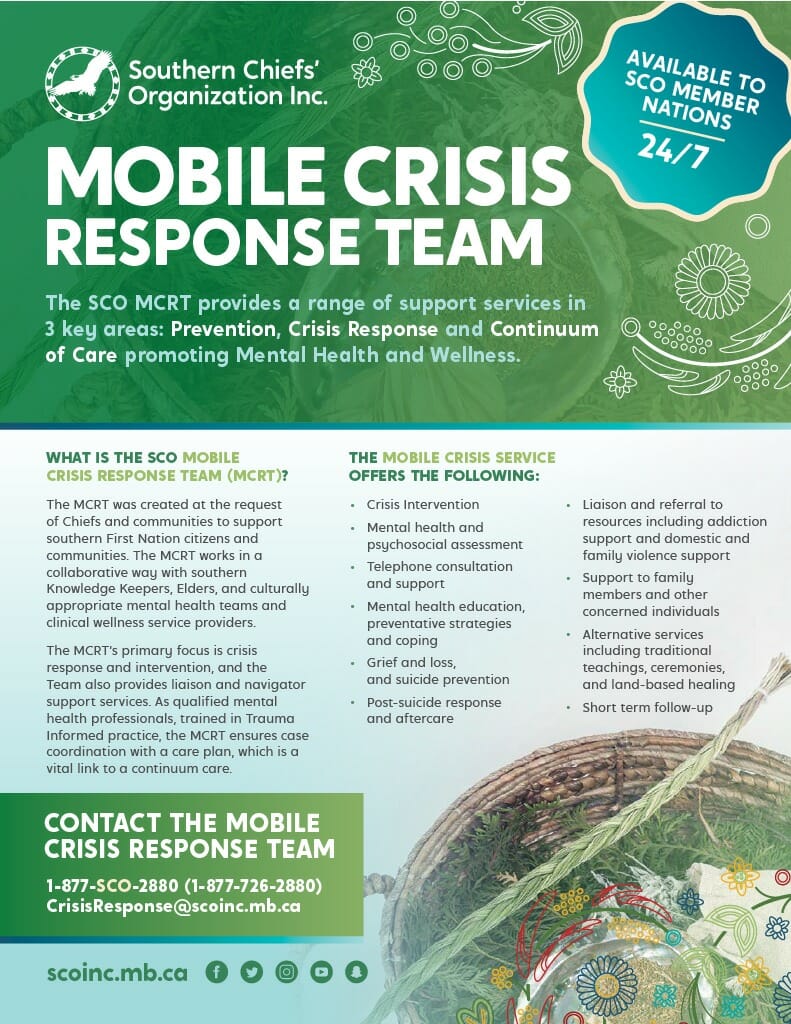SCO supports southern First Nation citizens and communities during times of crisis and always. Remember – you are not alone, and on this page are resources that can help. If you are struggling, please reach out.

If you are experiencing a life‐threatening crisis,
please contact your local emergency services (911) or RCMP detachment.
Manitoba Suicide Prevention and Support Line: Reason to Live
Toll Free Prevention and Support Line: 1-877-435-7170
Hope For Wellness:
Toll Free Hope for Wellness Help Line: 1‐855-242-3310
Online chat available at hopeforwellness.ca
SCO Mobile Crisis Response Team (MCRT)
The SCO MCRT was created at the request of Chiefs and communities, to support southern First Nation citizens and families. The MCRT works in a collaborative way with southern Knowledge Keepers, Elders, and culturally appropriate mental health teams and clinical wellness service providers.
The MCRT’s primary focus is crisis response and intervention, and the Team also provides liaison and navigator support services. The MCRT includes a range of services, delivering culturally responsive, trauma-informed, and appropriate southern mental health and wellness and includes members who speak Anishinaabemowin.
The Mobile Crisis Response Team members have many years of experience, including in the areas of:
- Psychiatric nurse
- Therapists
- Trauma Informed Counsellors
- Mental Health Specialists
- Cultural Advisory
How do I contact the Mobile Crisis Response Team?
- Toll Free #: 1-877-SCO-2880 (1-877-726-2880)
- Email: CrisisResponse@scoinc.mb.ca
- The MCRT is available 24 hours a day, seven days a week
Who can make referrals?
Calls or referrals come from Chiefs and Councilors, Health Directors, and are welcome from anyone who is concerned about a person or family living on reserve and experiencing a mental health or psychosocial crisis, including self-referrals and referrals from family members.
What can I expect when I call the SCO MCRT?
An intake Team member will take your call and work with you to triage an appropriate course of action based on the urgency, best interests, and request of the individual who is in crisis.
How quickly will help arrive?
Depending on the crisis, the MCRT can be deployed in as little as a few hours.
What services does the Mobile Crisis Service offer?
- Prevention
- Telephone consultation and support
- Liaison and referral to community resources
- Safe talk
- Mental Health education, preventative strategies, and coping
- Grief and loss
- Suicide prevention
- Crisis Response
- Critical incident stress debriefing
- Post-suicide response/aftercare
- Mental health assessment and psychosocial assessment
- Short term one-on-one counselling and follow up
- Individual client assessments such as suicide assessment and safety plan, self-esteem and depression scale, and mental health status
- Continuum of Care
- Support to family members and other concerned individuals
- Sharing Circles
- Drug and alcohol addiction support, assessment, triaging, and referral
- Domestic and family violence support and triaging
- Alternative services including traditional teaching, ceremonies, and land-based healing
- Referrals to traditional and clinical support services
The Right to Health and Wellness
First Nation citizens have a right to health and health services. Providing mental health and wellness services aligns with the broader goal of SCO’s Health Transformation initiative. For more information, visit the SCO Health Transformation webpage.
First Nation and Metis Mental Health and Wellness Providers – Winnipeg (PDF)

Caring for the Caregiver 2023
For the second year, the Mobile Crisis Response Team was proud to host a beautiful two-day gathering on November 22 and 23, 2023, to celebrate mental health advocates from our Nations. The theme for the 2023 Caring for the Caregiver Conference was “Mindfulness and Self-Care.”
Workshops and speakers focused on that theme throughout the event. From cedar baths to drum making, participants had the opportunity to take part in activities that bring laughter and joy, along with filling their “emotional tanks.”
The Southern Chiefs’ Organization (SCO) extends gratitude to the Elders and Knowledge Keepers, presenters, teachers, healers and helpers, and SCO team members who attended and supported this event.

Mobile Crisis Response Team Staff
Carol McCorrister, Director of Mental Health and Wellness
Debbie Houle, Administrative Assistant
Mobile Crisis Response Intake Workers:
Mobile Crisis Response Team Members:
SCO MCRT Presentations
SCO MCRT Program Update November 2022
First Peoples Wellness Circle – presentation for the SCO MCRT Wellness Gathering 2022.
Tribal Councils
Dakota Ojibway Health Services
- The Dakota Ojibway Tribal Council (DOTC) based in Headingley, provides an on-call crisis response for youth and adults who are in crisis due to mental health concerns, suicide, and/or addiction issues.
- An on-call service will be available during the COVID-19 pandemic via telephone and FaceTime. The on-call service is open to talk and debrief with the local health care providers and community members that are feeling isolated and distressed.
- Services six communities: Birdtail Sioux, Dakota Tipi, Long Plain, Roseau River, Sandy Bay, and Swan Lake
- Connect with the DOTC Mental Wellness Team: 1-833-600-0087
Interlake Reserves Tribal Council
- The Interlake Reserves Tribal Council (IRTC) is located in Winnipeg and provides virtual support during COVID-19.
- In a time of crisis, team members will attend to the community using highly sensitive and precautionary measures, as advised by Manitoba’s public health authorities. The Mental Wellness Team is tracking calls and supports for mental wellness. The IRTC Health Directors connect every Tuesday and Thursday via teleconference.
- Services six communities: Dauphin River, Kinonjeoshtegon, Lake Manitoba, Little Saskatchewan, Peguis, and Pinaymootang
- IRTC’s website and Facebook page will have information about coping skills for stress and anxiety.
- Connect with the IRTC Mental Wellness Team at 204-956-7413
Southeast Resource Development Council
- The Southeast Resource Development Council (SERDC) is in Winnipeg and has a team of nine staff including outreach workers, therapists, a cultural advisor, addiction specialists, Indian Residential School, Resolution Health Support Worker, and MMIWG support workers.
- During COVID-19, the team provides virtual support via telehealth, telephone, or videoconferencing for counselling and therapy to youth and adults who may experience feelings of stress, fear, and anxiety.
- Services eight communities: Berens River, Black River, Bloodvein, Brokenhead Ojibway Nation, Hollow Water, Little Grand Rapids, Pauingassi, and Poplar River
- SERDC website and Facebook page offers updates and supports.
- Connect with the Mental Wellness Team Program at 204-956-7500
Additional Resources
Local Emergency Services and Help Lines
If experiencing a life‐threatening crisis, please contact your local emergency services (911) or RCMP detachment.
Manitoba Suicide Prevention and Support Line: Reason to Live
- The Manitoba Suicide Prevention and Support line is a toll-free, confidential, and a 24-hour crisis line run by trained counsellors from the Klinic Community Health Centre. It provides immediate support and service to those struggling with suicidal thoughts or feelings, or to those concerned about a friend’s mental wellness and/or safety, and to family member impacted by a suicide loss or suicide attempt. Our counsellors understand that many people struggle with suicidal thoughts or behaviours.
- Toll Free Prevention and Support Line: 1-877‐435-7170
Winnipeg Crisis Response Centre
- Mental health experts are available 24/7 to help adults experiencing:
- A mental health crisis with the risk of potential harm associated with an immediate crisis including suicidal thoughts and behaviour
- Personal distress and other signs and symptoms of a mental health condition requiring urgent mental health assessment and treatment
- Intense emotional trauma where assessment, crisis intervention, and linkage to other services are required
- An immediate risk is posed after hours when the ongoing mental health service provider is not available
- Connect with the Mental Wellness Team: (204) 788-8330 or visit this website
Winnipeg Mobile Crisis Service
- Mobile Crisis Staff are available 24/7
- Offers crisis intervention, mental health assessment, telephone consultation and support, health education on mental illness, medication, coping strategies and preventative techniques, liaison and referral to community resources, support to family members and other concerned individuals, psychiatric consultation and assessment, and short-term follow-up.
- Connect with the Mobile Crisis Service: (204) 940-1781


